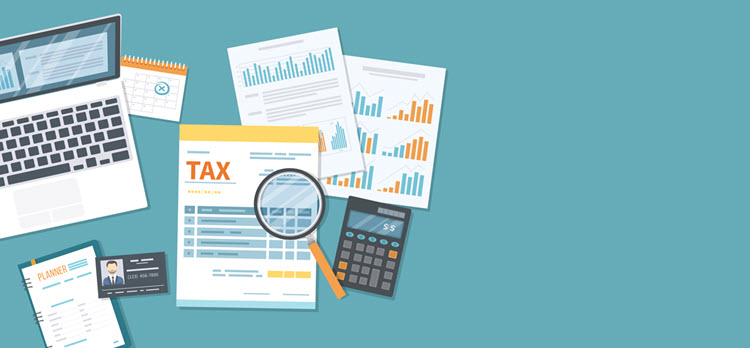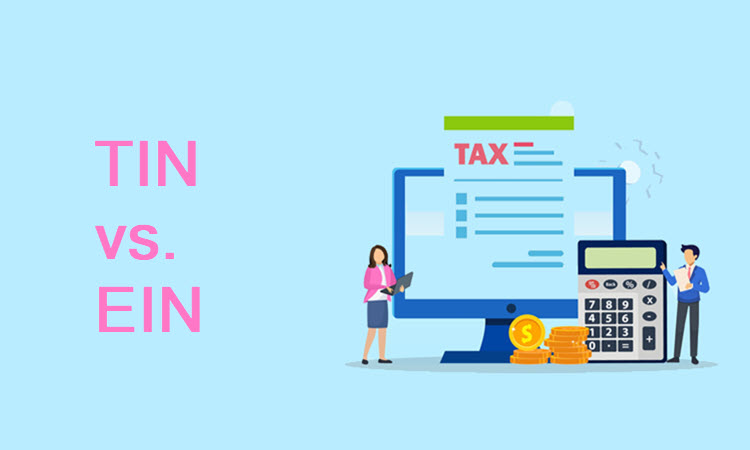Most U.S. businesses and individuals are required to file federal tax returns. For this purpose, they need to obtain tax identification numbers or TINs that help the Internal Revenue Service (IRS) identify taxpayers on their tax forms.
There are different kinds of tax identification numbers, and each one used for different purposes. One of these is the EIN or employer identification number.
This article explains the differences between a TIN and EIN, how to obtain them, and lists other tax ID numbers.
TIN vs. EIN: Main Differences
TIN is an umbrella term that includes several types of tax ID numbers, each with a different purpose. The IRS and financial institutions use these numbers to identify and track taxpaying businesses and individuals.
An EIN is a specific identification number that the IRS assigns to companies, and it applies only to business taxes. The terms TIN and EIN are frequently confused because an EIN is a type of TIN. However, a TIN can also be a person’s social security number (SSN) and other numbers the IRS gives to people without an SSN.
What Is a TIN?

The Tax Identification Number (TIN) is a nine-digit number the IRS uses to identify taxpayers, whether they are individuals, corporations, or non-profit organizations.
The following numbers are all types of TINs:
- Social Security Number (SSN)
- Employer Identification Number (EIN)
- Individual Taxpayer Number (ITIN)
- Taxpayer Identification Number for Pending Adoptions (ATIN)
- Preparer Taxpayer Number (PTIN)
The IRS approves and issues all TINs except the social security number, which the Social Security Administration (SSA) assigns to all U.S. citizens.
Tax identification numbers are used for the following purposes:
- Filing annual tax returns
- Claiming government benefits and services
- Obtaining credit from lenders
- Employment
- Claiming tax treaty benefits
How To Get a TIN?
TIN applications must be submitted to the correct agency online, via fax, or by mail. An SSN application is submitted to the Social Security Administration, while other TIN applications are submitted to the Internal Revenue Service.
All individuals and entities authorized to work in the United States need a TIN. Without one, they cannot gain employment, do business, file taxes, or claim government benefits and services.
What Is an EIN?
Employer Identification Number (EIN) is a nine-digit number the IRS uses to identify businesses on their tax returns. It is also called the Federal Employer Identification Number (FEIN) or the Federal Tax Identification Number (FTIN).
Aside from filing tax returns, businesses need an EIN for other reasons:
- Opening a business bank account. An EIN is required when opening a bank account which the company will use to send and receive payments.
- Online payment processing. Businesses that want to receive online payments need an EIN to apply for a merchant account.
- Hiring employees. Businesses need an EIN to set up payroll and register for state employer taxes.
- Obtaining a business loan. Banks and lenders will ask for a business’s EIN when considering a loan. A business’s credit score is tied to the EIN.
- Separating personal and business finances. An EIN protects your personal finances from liability when conducting business. It separates your personal credit score from your business’s and vice versa. This maintains credibility with clients, business partners, and financial institutions.
- Paying federal taxes on self-employed retirement plans. Self-employed individuals who have Solo 401(k) or Keogh retirement plans need an EIN to pay taxes on these plans.
- Filing for bankruptcy. EIN is required when filing for bankruptcy because bankruptcy estates are taxable entities.
Note: High-risk merchant accounts can be difficult to obtain. In these cases, relying on a trusted merchant service provider is essential. CCBill has over two decades of experience facilitating secure online payment processing for high-risk businesses.
How To Get an EIN?
To get an EIN, Submit an EIN application to the IRS online, via fax, or by mail. It includes filling out the SS-4 form. After the application is approved, the IRS will assign you an EIN number.
Employers, corporations, partnerships, and limited liability companies (LLCs) need to apply for an EIN, as do international companies wishing to conduct business in the United States.
Sole proprietorships and single-member LLCs without employees do not require an EIN. These entities put their SSN on their tax forms instead.
What Other Tax ID Numbers Should You Know About?

Here are other TINs you should know about aside from EIN.
- Social Security Number (SSN). The SSN is a nine-digit number the Social Security Administration issues to U.S. citizens and eligible U.S. residents. It is used to secure employment, receive social security and other government benefits, and track individuals’ earnings and years worked.
- Individual Taxpayer Identification Number (ITIN). ITIN is a nine-digit number issued to non-resident and resident aliens, their dependents, and spouses who cannot obtain an SSN. ITIN helps individuals comply with U.S. tax laws. However, it is not a substitute for an SSN and does not authorize individuals to work in the United States. It starts with the number 9 and is formatted the same as the SSN.
- Adoption Taxpayer Identification Number (ATIN). An ATIN is a temporary taxpayer ID number issued by the IRS for an adopted child who is a U.S. citizen or resident but does not currently have an SSN.
- Preparer Taxpayer Identification Number (PTIN). PTIN is an identifying number issued to paid preparers who calculate federal tax returns for individuals and businesses. When they file their personal taxes, they are required to list their PTIN on the tax form. Tax preparers need to renew their PTIN yearly by answering suitability questions to prove they satisfy educational requirements needed for a tax preparer.
Aside from federal tax identification numbers, businesses must also check whether the state where they are registered requires them to pay state-specific business tax. In this case, they need to apply for a state tax ID which will allow them to operate legally in the state and employ workers.
Conclusion
Individuals and entities wishing to gain employment, conduct business, and claim government benefits in the United States need to apply for the appropriate tax identification numbers.
A TIN or EIN is required for filing tax returns and must be included in all tax-related documents. They help the IRS keep track of individual and business taxes and facilitate many business procedures.
